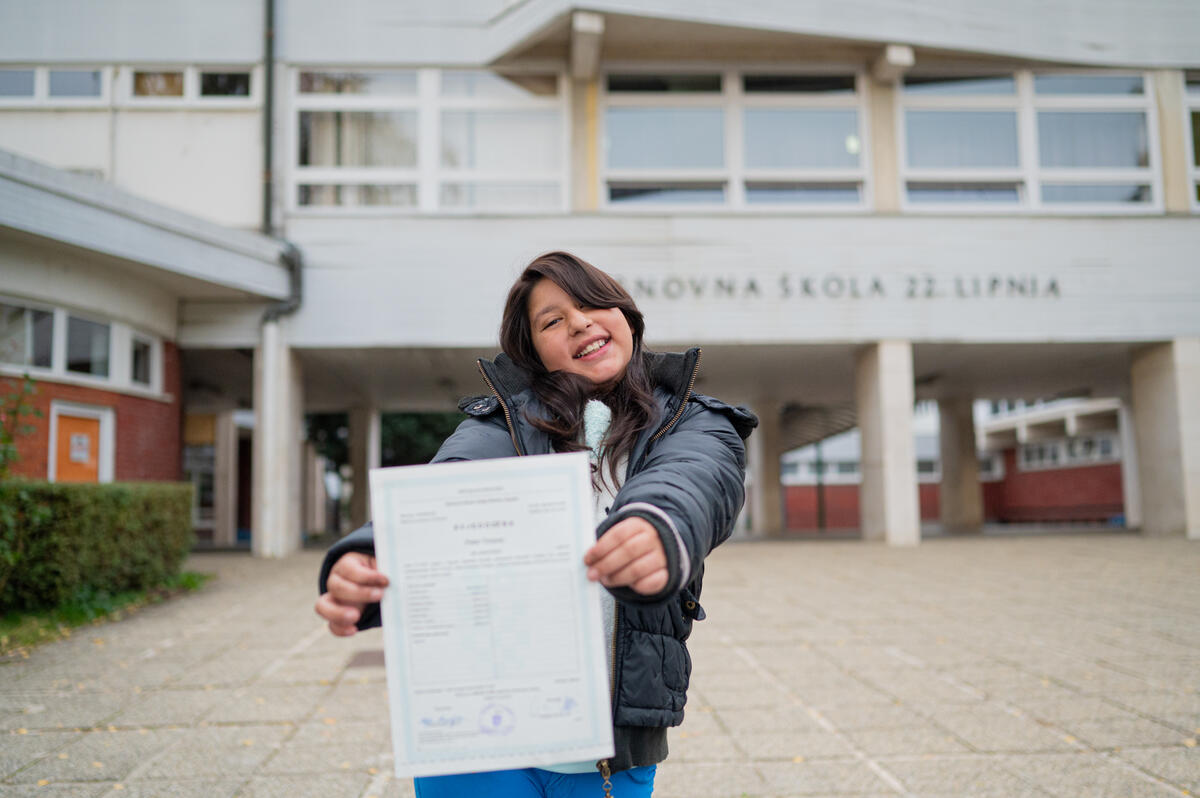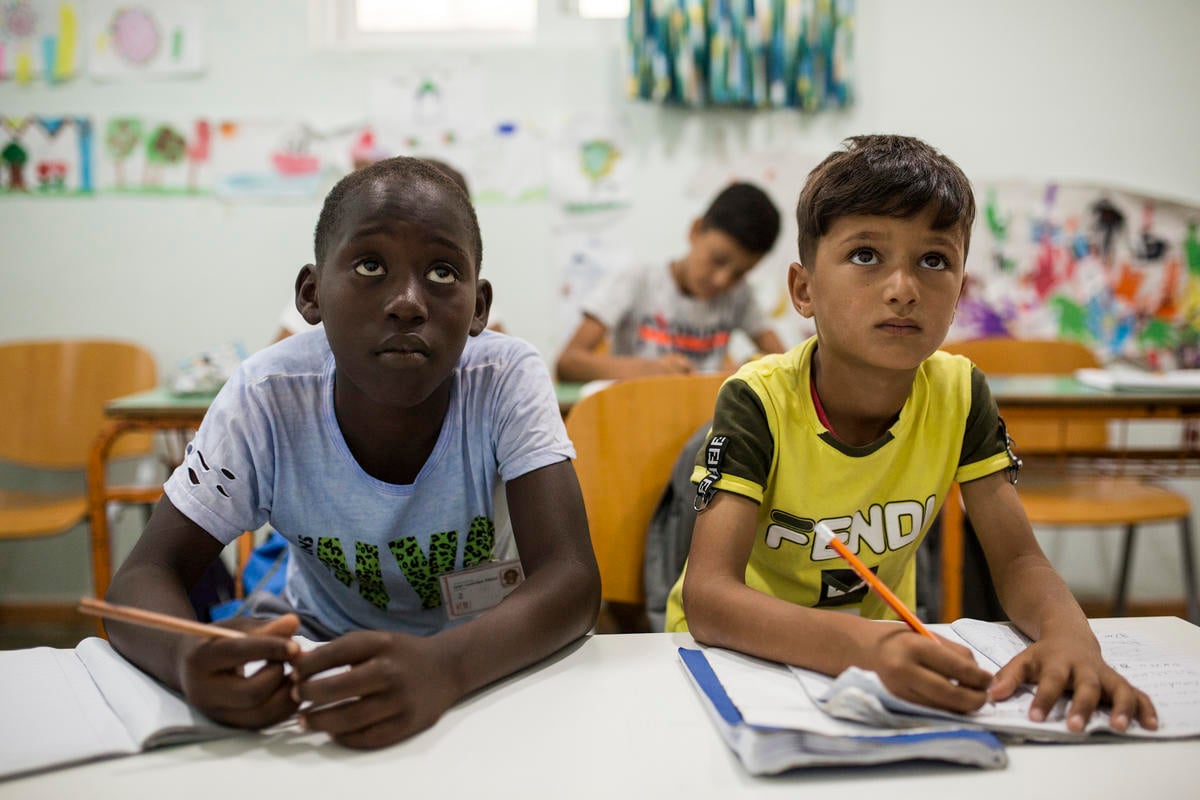Housing programme tackles the lingering problem of displacement in Croatia
Housing programme tackles the lingering problem of displacement in Croatia

POLJICE, Croatia, November 25 (UNHCR) - Not far from the picturesque Plitvice Lakes National Park in the mountainous karst area of central Croatia lies the nondescript hamlet of Poljice. Millions of tourists visit the lakes, but hardly anyone calls in on Poljice and its two inhabitants, 69-year-old Milan Sunajko and his wife Nedjeljka, aged 59.
Their stone-and-brick house is in a dreadful state, without proper plumbing and insulation, and they live in extreme poverty. But the pair are just thankful to be in their home region after a six-year absence that was enforced on them in 1995 at the tail end of the war in Croatia.
And they have been put on a priority list to move into a planned modern 29-apartment building in the town of Korenica under a special housing programme. This is aimed at ending a lingering displacement problem in the region by providing homes for some 74,000 vulnerable people - refugees, refugee returnees and internally displaced people - in Bosnia and Herzegovina, Croatia, Montenegro and Serbia.
"I am now 100 per cent sure that we will be cared for," Milan told UNHCR visitors to the hamlet, which is a six-kilometre hike from the nearest shop and cut off by snow in the winter. "UNHCR field staff visit us often and, seeing the international community behind it, gives confidence that our housing plight will soon end," he added.
Milan and Nedjeljka, who recently discovered she had terminal throat cancer, deserve a change in fortune. Before the 1991-1995 war in Croatia, the ethnic Serb pair lived a happy if simple life with their two sons in Korenica, where Milan worked as a clerk for the national park.
The war changed all that and in 1995 they fled to Serbia after Milan's parents were killed and a Croatian offensive forced more than 200,000 Serbs to leave their homes. The family lived in Serbia under very difficult circumstances until 2001, when Milan and his boys returned to test the waters.
Unable to return to their home in Korenica, Milan settled in the old family house in Poljice. "When I saw the surrounding mountains, I thought, that's it, I am back home," Milan recalled. "I needed to start from scratch, but nothing is too difficult if one is healthy." But the health of Nedjeljka, who returned in 2002 with UNHCR, is fading. Life is becoming a struggle for both; even putting food on the table every day is difficult, and the couple need help and some comfort.
Aside from struggling to live off Milan's monthly pension of about US$180, they also have to deal with Nedjeljka's illness, which means she needs to visit a specialist in the capital, Zagreb, a tiring journey that they can ill afford to pay for.
Realizing that they could no longer cope, the Sunajkos applied in 2010 for housing assistance from the government and received a positive answer but no concrete action. A solution for them seems to have come under the Regional Housing Programme, launched in Sarajevo in April last year, when donors pledged more than 260 million euros, including 230 million euros from the European Union.
The programme, a joint initiative of Bosnia and Herzegovina, Croatia, Montenegro and Serbia, is aimed at providing durable housing solutions and guarantees for the protection of the rights of the tens of thousands of vulnerable beneficiaries. "We are seeking to write the last chapter of the displacement in the western Balkans," UN High Commissioner for Refugees António Guterres said at the launch.
The Regional Housing Programme, whose total cost is estimated to be almost 600 million euros, will be implemented over five years by the four partner countries with the support of the international community, including UNHCR. In April 2013, international donors approved the first projects proposed by the four countries, including construction of the apartment building in Korenica. These initial projects will benefit 460 families across the region. More projects, benefitting 1,800 families in all four countries, were approved last month.
Milan is mostly upbeat about the programme, but he worries how much longer he and Nedjeljka will have to wait until the apartment block in Korenica is built - work is expected to start next year - and they can move in. UNHCR, recognizing their difficult circumstances, has strongly recommended that they be given one of the apartments in Korenica so that they can live in comfort and dignity.
"Although we are happy to know we will receive housing under the Regional Housing Programme, this may be one or even two winters away," said Milan. His wife, mindful of her serious health problems, warned: "I am not sure that we will manage another winter here in Poljice."
By Dorijan Klasnić and Neven Crvenković in Poljice, Croatia








